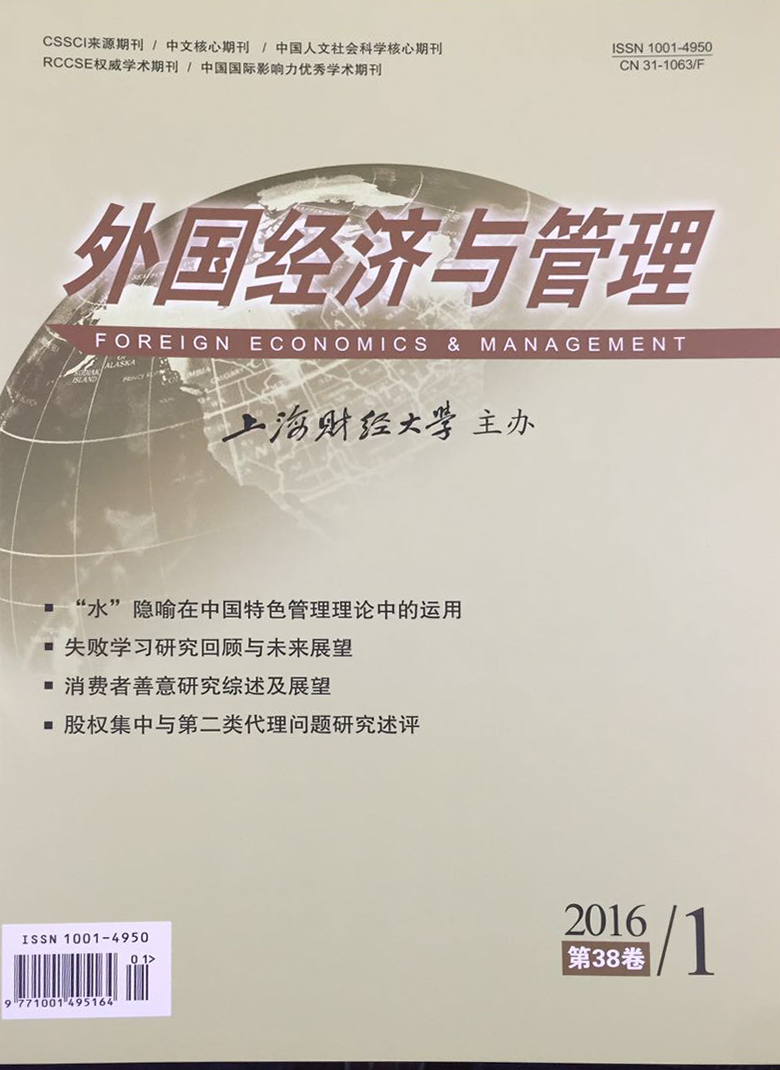本文从最优契约理论、管理层权力理论和心理所有权理论等视角对高管显性激励安排与代理成本关系的研究成果进行了述评,发现该领域研究正在逐步由关注单一激励安排的局部均衡分析阶段,向更加注重协同效应的一般均衡分析阶段过渡。针对现有研究存在的不足,本文提出了未来研究的展望,包括正确区分股权和期权激励对代理成本的不同影响、系统考虑显性激励与隐性激励的协同效应、深化心理因素对高管激励安排的治理效果等。
高管显性激励与代理成本关系研究述评与未来展望
摘要
参考文献
1 Abeler J, et al. Reference points and effort provision. American Economic Review, 2011, 101(2): 470–492
2 Albuquerque A, et al. Peer choice in CEO compensation. Journal of Financial Economics, 2013, 108(1): 160–181
3 Benmelech E, et al. Stock-based compensation and CEO(dis)incentives. Quarterly Journal of Economics, 2010, 125(4): 1769–1820
4 Bizjak J, et al. Are all CEOs above average?An empirical analysis of compensation peer groups and pay design. Journal of Financial Economics, 2011, 100(3): 538–555
5 Brookman J and Thistle P. Managerial compensation:Luck,skill or labor markets. Journal of Corporate Finance, 2013, 21(1): 252–268
6 Chahine S and Goergen M. The two sides of CEO option grants at the IPO. Journal of Corporate Finance, 2011, 17(4): 1116–1131
7 Chen J, et al. Managerial power theory,tournament theory,and executive pay in China. Journal of Corporate Finance, 2011, 17(4): 1176–1199
8 Coles J, et al. Structural models and endogeneity in corporate finance:The link between managerial ownership and corporate performance. Journal of Financial Economics, 2012, 103: 149–168
9 Conyon M and He L. Executive compensation and corporate governance in China. Journal of Corporate Finance, 2011, 17(4): 1158–1175
10 Corea J, et al. The power of the Pen and executive compensation. Journal of Financial Economics, 2008, 88(1): 1–25
11 Evans A. Portfolio manager ownership and mutual fund performance. Financial Management, 2008, 37(3): 513–534
12 Faulkender M and Yang J. Inside the black box:The role and composition of compensation peer groups. Journal of Financial Economics, 2010, 96(2): 257–270
13 Foster D and Young H. Gaming performance fees by portfolio managers. Quarterly Journal of Economics, 2010, 125(4): 1435–1458
14 Frydman C and Saks R. Executive compensation:A new view from a long-term perspective,1936-2005. Review of Financial Studies, 2010, 23(5): 2099–2138
15 Gabaix X and Landier A. Why has CEO pay increased so much. Quarterly Journal of Economics, 2008, 123(1): 49–100
16 Gayle G and Miller R. Has moral hazard become a more important factor in managerial compensation. American Economic Review, 2009, 99(5): 1740–1769
17 Guthrie K, et al. CEO compensation and board structure revisited. Journal of Finance, 2012, 67(3): 1149–1168
18 Hart O and Moore J. Contracts as reference points. Quarterly Journal of Economics, 2008, 123(1): 1–48
19 Hart O. Hold-up,asset ownership and reference points. Quarterly Journal of Economics, 2009, 124(1): 267–300
20 Hung M, et al. Managerial personal diversification and portfolio equity incentives. Journal of Corporate Finance, 2012, 18(1): 38–64
21 Jensen M and Meckling W. Theory of the firm:Managerial behavior,agency costs and ownership structure. Journal of Financial Economics, 1976, 3(4): 305–360
22 La Porta, et al. Corporate ownership around the world. The Journal of Finance, 1999, 54(2): 471–517
23 Larkin I, et al. The psychological costs of pay-for-performance:Implications for the strategic compensation of employees. Strategic Management Journal, 2012, 33(10): 1194–1214
24 Lee J, et al. Birds of a feather:Value implications of political alignment between top management and directors. Journal of Financial Economics, 2014, 112(2): 232–250
25 Minnick K and Rosenthal L. Stealth compensation:Do CEOs increase their pay by influencing dividend policy. Journal of Corporate Finance, 2014, 25(6): 435–454
26 Mishra D. The dark side of CEO ability:CEO general managerial skills and cost of equity capital. Journal of Corporate Finance, 2014, 29(10): 390–409
27 Morse A, et al. Are incentive contracts rigged by powerful CEOs. The Journal of Finance, 2011, 66(5): 1779–1821
28 Narayanan M and Seyhun H. The dating game:Do managers designate option grant dates to increase their compensation. Review of Financial Studies, 2008, 21(5): 1907–1945
29 Robinson D T and Sensoy B A. Do private equity fund managers earn their fees?Compensation,ownership,and cash flow performance. Review of Financial Studies, 2013, 26(11): 2760–2797
30 Zhang X M, et al. CEOs on the edge:Earnings manipulation and stock-based incentive misalignment. Academy of Management Journal, 2008, 51: 241–258
31 陈 仕华, et al. 国有企业纪委的治理参与能否抑制高管私有收益. 经济研究, 2014, 49(10): 139–151
32 徐 宁, 徐 向艺. 技术创新导向的高管激励整合效应:基于高科技上市公司的实证研究. 科研管理, 2013, 34(9): 46–53
33 周 黎安. 中国地方官员的晋升锦标赛模式研究. 经济研究, 2007, 7(36): 36–50
引用本文
徐向艺, 陆淑婧, 方政. 高管显性激励与代理成本关系研究述评与未来展望[J]. 外国经济与管理, 2016, 38(1): 101–112.
导出参考文献,格式为:
上一篇:股权集中与第二类代理问题研究述评





 7538
7538  10766
10766

